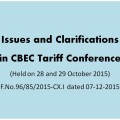Classification of “Saree” does not change even after embroidery, stitching of lace and tikki
CBEC vide Circular No. 1054/03/2017-CX [F. No. 116/31/2016-CX.3] dated the 15th March, 2017 has clarified that “saree” which has undergone further processing such as embroidery, stitching of lace and tikki etc. and stitched with two or more kinds of fabrics will be classifiable as “saree” under Chapter 50, 52 and 54 of the Central Excise Tariff Act, 1985 depending upon the material of the fabrics, and not as made-ups under Chapter 63 of the said Act. Each case may be decided on the basis of facts of the case and where further processing of “saree” does not change the essential characteristics of the fabric as that of “saree”, it should continue to be classified as “saree”.
CBEC Circular No. 1054/03/2017-CX [F. No. 116/31/2016-CX.3] dated the 15th March, 2017
Sub: Classification of ‘Saree’ under CETA, 1985-reg.
Representations have been received from the members of the trade requesting clarification regarding classification of “saree”. The issue raised in these representations is whether the goods described as “saree” which has undergone further processing such as embroidery, stitching of lace and tikki etc. and stitched with two or more kinds of fabrics is classifiable as “saree” under Chapter 54 or as made-ups under Chapter 63 of the Central Excise Tariff Act, 1985.
- The issue has been examined. As per Rule (1) of General Rules of Interpretation of the Schedule, “The titles of Sections, Chapters and Sub-Chapters are provided for ease of reference only; for legal purposes, classification shall be determined according to terms of the headings and any relative Section or Chapter Notes…”. Further, as per Rule 3(a) of the said Rule, “The heading which provides the most specific description shall be preferred to headings providing a more general description….”.
-
“saree” has been specifically classified under Chapter 50, 52 and 54 of the Central Excise Tariff Act, 1985 depending upon the material of the fabrics. Further, even after stitching, embroidery work and fixing of falls etc., a “saree” remains fabrics only as no new item emerges having distinct name, character and use. Stitching of two or more different kinds of fabrics also does not take away its classification from heading 50, 52 or 54 as in that case, by virtue of Section note 2(A) of Section XI, such “saree” will be classifiable under the heading as if consisting wholly of that one textile material which predominates by weight over any other single textile material. In case no one textile material predominates by weight, “saree” is to be classified as if consisting wholly of that one textile material which is covered by the heading which occurs last in numerical order among those which equally merit consideration.
-
Chapter 63 covers „Other made up textile articles; sets; worn clothing and worn textile articles; rags‟ which is a more general description. “saree” is not specifically classified in this chapter and therefore application of Rule 3(a) [refer para 2] would take out “saree” outside the ambit of chapter 63.
-
In view of above, it is clarified that “saree” which has undergone further processing such as embroidery, stitching of lace and tikki etc. and stitched with two or more kinds of fabrics will be classifiable as “saree” under Chapter 50, 52 and 54 of the Central Excise Tariff Act, 1985 depending upon the material of the fabrics, and not as made-ups under Chapter 63 of the said Act. Each case may be decided on the basis of facts of the case and where further processing of “Saree” does not change the essential characteristics of the fabric as that of “saree”, it should continue to be classified as “saree”.
-
Difficulty faced, if any, in implementing the circular should be brought to the notice of the Board. Hindi version will follow.
(ROHAN)
Under Secretary to the Govt. of India




